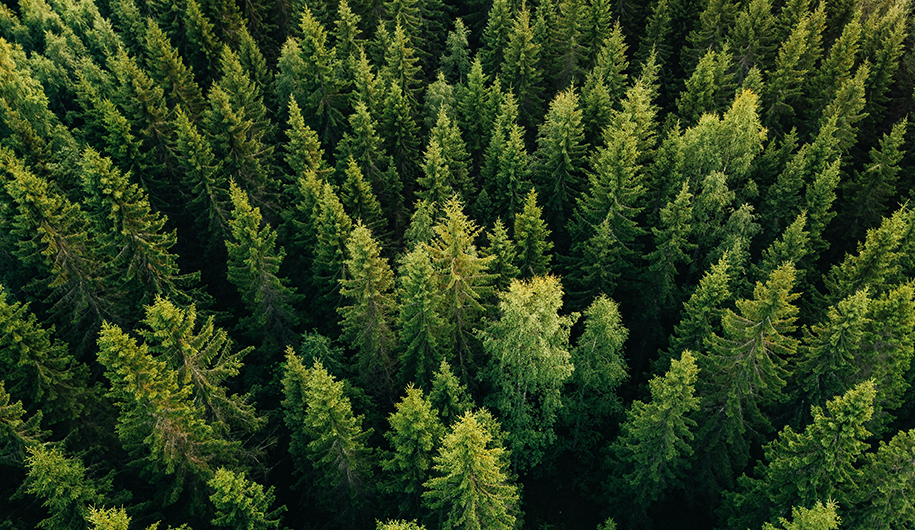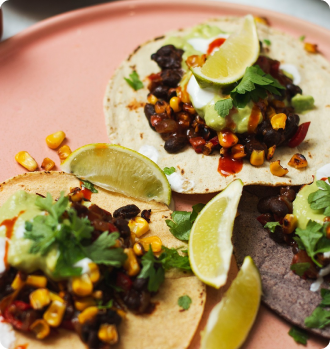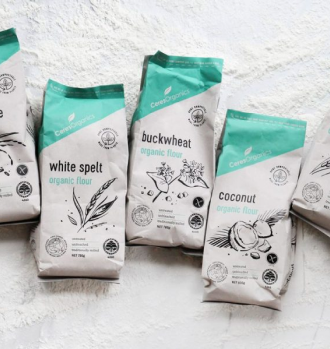
Eco-conscious eating: why more people are choosing a low-carbon diet
With the growing focus on sustainability in our society, there’s a new food megatrend on the block and it’s here to stay in a big way! People are shifting to low-carbon over low-carb, with one in three New Zealanders and Australians now choosing to reduce or eliminate meat.
What’s driving this shift? There are many reasons and the environment is a big one.
It’s never been more important to connect the dots between our actions and the impact on the planet. While it might feel like we can’t make a difference on our own, we most certainly can! Especially when we are part of a collective and growing movement. A low-carbon, eco-friendly lifestyle is one of the best places to start and here are the reasons why.
How does food fit in?
What we eat each day forms a significant proportion of our environmental footprint, yet this was not widely known or accepted by the public until recently. Manufacturing, processing, packaging, shipping and waste place demand on natural resources and it’s an area many people are becoming more mindful of.
Over the last century, the population has boomed from less than two billion people to over seven billion. That means there are four times as many people for the earth to support with water, food and other natural resources.
Science now indicates that the more plant-centric our diets, the smaller our food footprint. There are many studies and reports that highlight this, including a recent paper by Jonathan Drew and fellow researchers at the University of Otago titled ‘Healthy and climate-friendly eating patterns in the New Zealand context’. The research found that plant foods, including vegetables, fruits, legumes, and whole grains were substantially less climate-polluting than animal-based foods, particularly red and processed meats. Shifting to a healthy plant-based diet may reduce a Kiwi’s diet-related emissions by up to one third, and if avoidable food waste is eliminated then a further 10-12% of emissions could be saved.
Further afield, the 2019 study by Oxford University is the most comprehensive to date when it comes to comparing the environmental impact of different methods of food production. Data from over 38,000 farms showed that plant foods have far less impact on many aspects of the planet than animal foods.
In a report published last year, The New Zealand Ministry of Health have recommended reducing meat and dairy and choosing environmentally friendly food options by purchasing food items from suppliers who use less pesticides and fertilisers in their food production practices. The Ministry of Education have also suggested eating less meat and dairy in their new climate change resource for schools.
Food choices have been highlighted by some groups as the most wide-reaching and impactful area where people can make a difference.
What does sustainability mean?
In a sentence, environmental sustainability means ‘existing in a way that could be continued forever’. This involves harvesting renewable resources at a rate equal to or lower than they can be replenished, creating pollution at a rate in which it can be neutralised or offset, and conserving non-renewable resources. If a behaviour can’t continue indefinitely, it is not environmentally sustainable.
The more aware we are of what contributes to our environmental footprint, the more we can reduce it! Take the FutureFit quiz to learn more about the nature of your environmental footprint and gain some motivation and ideas from the process.
7 ways that we can protect the environment
Eco-friendly eating can have a hugely positive impact on climate and other aspects of the environment. Here we will briefly touch on seven parts of the ecosystem that we can help protect through our food choices.
1: Water
Fresh water is one of the most precious resources we have as we all require it to live - and we are depleting it fast. Around 1 billion people already live without adequate access to fresh water and this will increase in the future unless we begin to manage our water usage more sustainably. We don’t often consider the amount of water that our food takes to produce, but a plant based household uses up to 95% less water than a non-plant-based household. A powerful reason to make a change!
2: Land & deforestation
Livestock occupy almost half of the earth’s total landmass. There are upwards of 50 billion animals raised for food on the planet - and they take up a lot of space! Converting natural land for animal farming is having a significant impact on forests. Since the 1970s, over 20% of the Amazon rainforest has been cut down. It is reported that over 90% of that cleared land is used to raise animals for food. Additional land is required to grow food to feed the livestock making it an extremely inefficient way to produce food.
Plant-based foods require only a fraction of the agricultural land that already exists and could easily supply enough food to feed our global population.
3: Soil degradation
Soil is highly underrated! All of the nutrients in our food come from soil, so it’s important that we look after it. Chemical pesticides can harm or destroy the web of life that is found in the soil, so it’s best to choose organic where possible.
Organic foods are grown without the use of synthetic (artificial) additives; this includes pesticides, herbicides, man-made fertilisers and genetic modification. Working in partnership with nature will allow us the best chance of restoring habitats and improving biodiversity.
Grazing livestock can destroy native vegetation whist compacting and eroding top soil from the land many times faster than plant-based crops. Much of the topsoil on the earth has been damaged by heavy use of fertilisers or has been lost and every year tens of millions of acres of land becomes desert - further reducing the capacity of the world to produce food for the future.
4: Wildlife
Devastatingly, the world is currently experiencing it’s 6th mass extinction, where we are losing species at 1000-10000 times the natural rate. Habitat loss from farm animals and their food crops is the biggest threat to native animal populations. Plant foods have far less impact on natural habitats and if our global population shifted towards a plant-heavy diet then some agricultural land could be returned to the wild.
5: Fresh water pollution
In New Zealand and around the world, Iivestock are a leading cause of pollution of lakes, rivers and other waterways. Farm animals excrete significant amounts of nitrogen, phosphorus, potassium, pharmaceutical drug residues including antimicrobials and hormones, as well as heavy metals, parasites and pathogens. Water can become unswimmable and undrinkable, fish die off and the pollutants often end up making their way into the ocean. Growing organic plant crops instead and managing these farms in a sustainable way would help bring back swimmable and drinkable lakes, rivers, and waterways.
6: Oceans
Overfishing and plastic pollution are big issues. Over 1 trillion fish are caught every year and it is reported that in the last century more than 90% of large fish stocks have been removed from the ocean. Tens of thousands of metres of non-degradable fishing nets have also been left in the oceans, making fishing one of the major sources of plastic pollution.
Ocean dead zones’ are another big problem. Farms often have nitrogen runoff which can lead to massive oxygen depleted areas in the ocean where nothing can survive. These areas have expanded by about 800% in the last 50 years and now approximately double each decade. The largest ocean dead zone is in the Gulf of Mexico and is over 70,000m². Choosing plant foods in reusable or compostable packaging could help us to protect and restore our seas.
7: Climate crisis
Whilst changes in climate have happened many times in the past, in our time it can best be described as a climate that is breaking down. Climate change is one of the greatest challenges of our generation. But the good news is, we have the chance to help turn this around. In particular, more and more young people are stepping up to lead the charge.
Farming of animals contributes anywhere from 14-50% of total global ‘greenhouse gases’. New research from Otago University shows that eating just one plant based meal per day can reduce our food-related emissions by 23% and a fully plant-based diet can reduce them by up to one third. Replacing meat with beans, lentils or hummus at one meal each day is a great place to start.
Spotlight on organics
Organic and permaculture farming allows nature to get on with doing what it does best. Growing food this way is more sustainable, uses significantly less energy and renewable resources to produce and it generates fewer greenhouse gases. Organic food systems also help prevent erosion by reducing the impact of wind and water.
By choosing eco-friendly foods, we are helping to create habitats for insects and wildlife and protect the quality of our lakes, rivers, oceans and drinking water. So by eating organic, we are supporting growers to grow more of the good stuff!
Tips on shifting towards a climate friendly approach
As you might have guessed, the number one change we can make on a daily basis is to move towards a plant-based lifestyle. More plant-based meals and more organic foods means less pollution and more sustainable living, leaving behind a more beautiful place for future generations. As Dr Taisia Cech described in her Ceres Organics blog, eating more plants can also have significant benefits for our personal health. If you’d like to learn more about organics, check out this fantastic summary for all the info.
Voting with our dollar can have a huge impact, so it’s rewarding to buy from companies that have sustainable values such as Ceres Organics. Choosing to buy packaging that is compostable is the ideal, and if not then go for recyclable. Composting food scraps will also create far less carbon emissions than sending these to the landfill, so starting a compost for your plant-based waste is an awesome idea or go to ShareWaste NZ to find someone local that will take your scraps.
Making a change in our dietary choices can be challenging or overwhelming at times, so take it at your own pace. Start slowly and get used to working with tasty new grains, legumes, fruits, vegetables, nuts and seeds. Jackfruit, black lentils, savoury yeast and buckwheat are some of my favourites - give my easy ‘Anytime Salad’ a go. Most importantly, find recipes and dishes that you love, so that it will be a lifestyle that you enjoy. The Better Base and Plantify websites are both worth a look for delicious recipes!
Hannah is the founder behind the plant-based movement 'The Better Base', a community that's dedicated to supporting you to make the change in adopting a plant-based lifestyle. Hannah created The Better Base to help raise awareness, and support people who are ready for change. After researching more into a plant-based lifestyle, Hannah gave up her love of eggs, cheese and "I could never give up meat" to trial a plant-based lifestyle for four months. What she found was her eczema cleared up, energy levels were higher than ever and her weight dropped. On top of the personal benefits, she knew it was an investment into a healthier future for herself, the planet, all those on it, and all those who are yet to come. If you want to learn more, Hannah is happy to help at thebetterbase.com.






